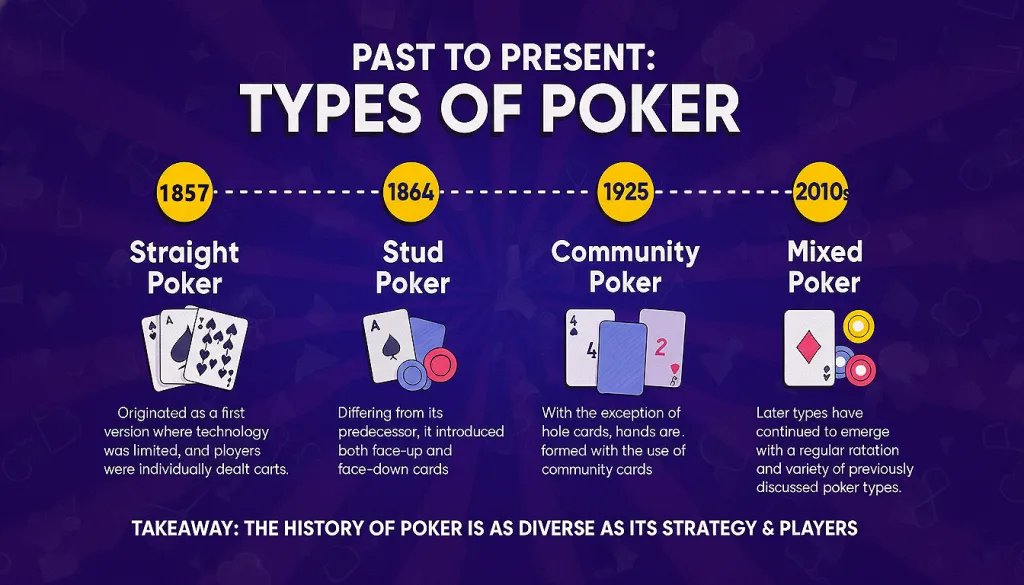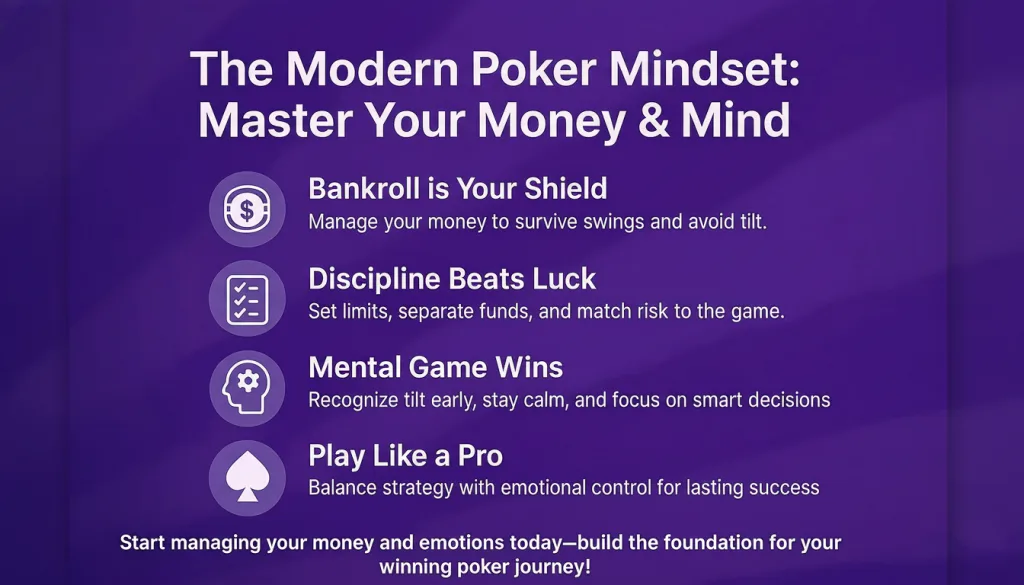A Complete Guide to All Kinds of Poker for Beginners! Imagine playing poker in a virtual table. You have cards on the table, chips piled up and the next move is completely on you. Poker is not only a game of luck, it is a science of reasoning, feeling and timing that has been developed since smoky riverboats to a billion dollar online casinos. Nowadays, to know how to play poker is not just to know when to bet or not, it is a matter of learning to play with a state of mind.
Disregard all you have ever heard about poker being just a game of gut feelings or tells. Though these aspects have their role, the modern poker environment, which has been developed over decades and transformed by the revolutionary AI, requires a new way of approach.
Today begin playing poker by looking at credible online sites. Bring in enhanced strategy guides.
Way to Becoming a Poker Strategist
This beginner guide to poker has been designed to help you go beyond the wondering stage to the knowing stage. You will get to know the history and the development of poker, how each form of poker develops distinctive skills, and how you can apply the strategies to play online and live.

What You’ll Learn.
- Poker history and development.
- Principles and rules of popular variants.
- The most relevant strategies are positional play, bankroll management and the mental game.
- Learning poker online, how and why it is safe.
- How to choose the best poker game to play on your trip.
What is the most effective tutorial to learn any form of poker?
This comprehensive guide includes all the major forms of poker such as Texas Hold’em and Omaha, tips about basic strategy’s positional play and bankroll management and information about how to practice poker online and how to play fair, up to equip beginners with a strategic background.
What is Poker? The Essentials Every New Player Should Understand

The History of Poker: From Riverboats to International Attraction
In the young 1800s, poker was born on the Mississippi River, where it grew from the old euro games like poque (/pɔk/), and Pochspiel /ˈpɔxʃpiːl/), into the 52 card game we still play. These wandering gambling halls were much more than card rooms they were the start of betting and lying, the two core parts that made poker a mental fight.
As Britannica claims, in regard to the origins of the game, “it is widely regarded as descending from the French game of poque and the German game of Pochspiel,” it is clear how collaborative the ethnicity had to be to create the modern forms of poker.
This allows you to acknowledge that the term “tech upgrade” was originally bluffing which allows you to start to view all poker and your play as skill through your perception and change the idea of poker being games of luck.
Poker is not chance, it is strategy, psychology and war and that is the distinction between a player and a gambler.
Basics Concepts that stand the Test of Time
Poker has changed, alright; but its fundamentals are eternal. There are still principles that define the winner and the spectator on a steamboat in the 19th century or on a 3UP Gaming digital room with AI bots.
Position assists you in making luck to your benefit, a small benefit which will be multiplied into profit.
Hand Reading, Range Construction: Reading Your Opponent
The modern theory of poker thinking was developed in The Theory of Poker (David Sklansky, 1987): not the prediction of one hand, but a collection of potential hands. This psychological change: “What do they have?” to “What could they have? “, is what led to systematic decision-making.
Through the combination of the size of bets, timing and position you rationally eliminate what your opponent may be holding. It is not a speculation, but reasoning.
Texas Hold’em and Omaha: Your Introduction to the Popular Variants

Texas Hold’em: Rules and Gameplay
In 1970, when the World Series of Poker (WSOP) was introduced at Binion Horseshoe casino, it inadvertently crowned a format that was to dominate the world; No-Limit Texas Hold’em. The first year saw only seven players and Johnny Moss was elected champion by his fellow players. Hold’em was later made the international standard of competition, strategy and fame by the success of the WSOP broadcast.
Texas Hold’em is the best place to start with as a beginner. It is free, and full of resources, and is just right in terms of luck and skill. Knowing it initially will establish the basis of all other variations and train you to play online and in real life tournaments.
Omaha poker: The four card challenge
Now take Texas Hold’em, but it got two times harder. For Omaha poker all the players get 4 hole cards, but you got to play with 3 community cards and only 2 of them. This turn make the play harder and make you think more sharp. As you get more hands, you get more mistakes, and you got to get your hand read right.
- The more hands, then more mistake, and more your hand read need to be right.
- If you learn Hold’em, then Omaha will be the next rank in poker and cards.
- Start with Texas Hold’em, the best way to learn poker. When you get good and want hard, then go to Omaha.
Note:
All poker type are just different ways to speak the same thing. Know well how to speak Hold’em before you get more words. Your bet, time, and mind trick skill will be used at every table you went to,
The Contemporary Poker Psychology: Gut Feeling to Calculated Strategy

Smart bankroll management
You are on the virtual felt, and before you is a monster pot, and a guttural all-in staring up at you. It is not random that you leave the table with your stack, or you hit tilt, it is bankroll management.
Online poker has created more volatility in the modern world; even one bad beat can be devastating. However, disciplined players apply strategic principles: they set limits on the session, make a clear division between play money and living expenses and risk allocation based on the type of the game. For instance, an online grinder with a middle-stakes can lose a big pot but can stay with his/her bankroll plan and, in doing so, they do not make emotional mistakes in the next hands.
Bankroll management is a practical skill that will ensure survival. It enables the players to master swings and thus turn the emotional chaos of poker into a repeatable and calculated decision-making process. This is not just math, although it is self-mastery.
It is not just that poker is a game of intuition, you need to manage your bankroll as well as manage your opponents.
Control Your Psychology to Avoid Going on Tilt
Poker is less about the cards dealt and more about the war going on inside us. The emotional after-shock from losing or becoming disappointed in a hand or of an other player’s tilt has taken hundreds of thousands of buy-ins from players over the years. The first step to having a strong mental game is knowing when tilt has hit. After experiencing frustration or tilt it is important to take a moment and breath before reinforcing bias, taking a step back to assess the situations that led to frustration objectively.
Modern poker, multi-table format, short action, online conveniences, etc. all contribute to extreme emotional peaks and valleys. This emotional ride is similar to professional athletes, you will need to work just as hard upstairs as you do during your drills in the gym.
Your Online Training Ground: How to Survive the Online Poker Ecosystem
The Moneymaker Effect: The Democratization of Online Poker
Chris Moneymaker, a self-taught accountant who won in an online satellite, he won the Main Event, which caused a worldwide boom.
Democratization of access was made through platforms. As such that players were able to experiment with positions, test strategies and see various styles without having to leave the house. The result? Millions of new players that embraced poker as a skill game.
Real Time Solutions for Calculating Equity
Poker today is not only about instincts, but it is informed. Online customers have real-time odds calculators and hand simulators, which show probabilities, expected value (EV) and optimal lines. Suppose that a beginner is on the turn with a flush draw: the client estimates that he has a 54 percent chance of winning.
In the age of digital

Online poker is a game that requires trust. RNG certification what is to say that the deal of the cards is random which in turn removes any system in the cards. As for the main idea which is for novices to pay attention to sites that offer high placement of those; which they do for each hand to guarantee that which is presented is truly fair and repeatable.
The issues we face are from bots, data farming bots and collusion.
Conclusion: How to get into poker as a player in the world of it?
Since the days of riverboats, in the time of early AI, what won out was a result of great bankroll management, mental toughness, and the fine-tuning of basic concepts. We start with Texas Hold’em, go online to play, take advantage of the advanced tools which include equity calculators and also at all times play within the lines.
Main Points:
- Poker is a blend of psychology, math and strategy; at which we see that intuition isn’t enough.
- Basic skills like position awareness, bankroll management and tilt control are for the long term.
- Texas Hold’em is the game we recommend for beginners. (read why above).
- Online platforms don’t compare in terms of access, also they provide real time tools and practice.
- Reliability of play is a result of the RNG certification, and we also have in place anti-bot and anti-collusion measures.
3UP Gaming develops the technology discussed here: Crypto Poker, White-Label Platforms, AI Bot Design, Anti-Fraud,
Glossary of Words related to this article
- Bankroll Management: Proper management of your poker bankroll to weather losses and present for calculated, emotion free plays. That is the base skill which separates professionals from amateurs.
- Tilt: An issue of frustration or anger which in many cases follows a bad beat or series of losses and as a result produces poor irrational decisions. To do well in the long term tilt must be recognized and controlled.
- Positional Play: In the which is to base decisions on where you are seated in relation to the dealer. Late action is also an advantage as you get to see more of what transpires, which in turn gives you a large strategic edge.
- Hand Reading: In a higher level of play you will see the ability to tell what hand your opponent is holding by their bet size, position, and action speed which in turn takes the focus off of what you are holding.
- RNG (Random Number Generator): A certain algorithm which online poker sites use for card shuffling and dealing which is certified to be fully random. Also this tech which ensures fair play and consistent statistical results.
- Hole Cards: At the start of each hand private cards are given out face down to each player. In Texas Hold’em players get two; in Omaha they get four.
- Community Cards: In the middle of the table the cards are put out face up for all players to use in making their best five card hand. In games like Texas Hold’em and Omaha the community cards are used.
- Equity: At any point during a hand the chance that a player will win the pot. Today with online tools players are able to determine hand equity in real time which in turn informs strategy.
- Betting Rounds: In certain stages of a poker hand (pre-flop, flop, turn, river) players may check, bet, call, raise or fold. Every round also which gives out a chance to get information and build the pot.
FAQ about types of poker for beginners
- Which poker game is best for beginners?
Texas Hold’em is a simple game to get into because of its large following, wide array of resources available and the hand structures which are more approachable as compared to Omaha or Stud games. - What varieties of poker are there?
There are many in fact hundreds of different versions of poker out there but what you will see the most of are community card games which include Texas Hold’em and Omaha, Stud games which include Seven Card Stud and Draw games which we see in Five Card Draw. - Texas Hold’em vs. Omaha: What do we have that isn’t the same?
In what we see the main difference is that in Hold’em players get 2 hole cards and in Omaha it is 4 which you in turn must use exactly 2 of along with the 3 community cards to make up your best hand. - Is at all possible for a beginner to play poker online for free?
Yes at present most online poker platforms have what we may call “fun money” tables or “freemium” models which we put to use as a base for new players to practice in a risk-free environment. This is a great way to get familiar with the site and to get a feel for the play before we put real money on the table. - What is the best way to turn the tables in poker?
Start with basic things: Play fewer hands but play them very aggressively, see where you stand at the table and determine basic pot odds. As you progress, get into GTO theories and hand reading. - Is luck or skill which is more important in poker?
While there is an element of chance which plays into it, poker is a game of skill which you play and which you tend to do well at over the long term. What you know of probability, of psychology, what you put into risk management is what will see you through in the face of that which is random, a fact which has been proven by decades of strategic study and AI research. - In what does the number of betting rounds in poker vary?
In many poker games action is run in what we may term as rounds which may be pre-flop, flop, turn and river in the case of Hold’em and Omaha. During each of these rounds players have the choice to check, bet, call, raise or fold which in turn builds the pot and also plays a role in how the other players act. - What is the poker action that is most played in casinos?
Texas Hold’em is by far the most popular casino game out there, and we see it presented in No-Limit and Limit versions. Pot-Limit Omaha also does very well for itself which is especially true in the higher stakes games. Seven-Card Stud still has a presence in some card rooms, but overall is not as popular.


